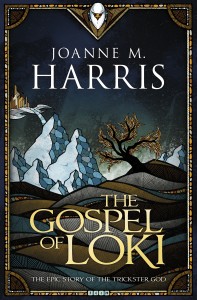Told in first person narrative, Harris' novel is a mash-up of modern slang and old tales. The first few chapters take some perseverance, but once Loki joins Odin in Asgard, the pace really picks up and the trickster god's biography has a number of humorous points. As a classicist, reading the novel it was interesting to note the similarities with traditional epic works, and where Harris had made the genre her own - most notably with the use of first person. Loki's prevalent voice makes the book an ideal introduction for newcomers to Norse mythology, though of course one should not expect Harris to have stayed 100% true to the myths. Creative license, people. Indeed, on her website, Harris claims the novel is only 75% true to her original source material.
With Loki's roguish and slippery-customer personality front and centre, the novel is almost certain to appeal to anybody who is still waiting for Marvel to announce a spin-off from Thor and The Avengers, revolving solely around Tom Hiddleston's incarnation of the horn-helmeted god. However, fans should expect to be surprised by Loki's origin, which is substantially different from the story many people will have become familiar with if they read any of Marvel's comics or watched the films. Anyone looking to find out something new about more of the background characters will be disappointed to see that for others in the stories, readers barely see anything more than a reflection off a mirror. Loki and Odin's motivations form a large part of the plot, but Thor, Sif, Heimdall, et al are barely given the time of day. For a 320 page book though, it would be slightly absurd to expect anything different.
Stereotypically, Loki falls into the recent trend of the popular villain, but at the same time because we are told all of the stories from his perspective, every action is justified. Even though this style of narrative allows us to sympathise with Loki, it's also easy to recognise how flawed his character is. There are a number of questions that accompany the first person narrative; primarily though, can we trust Loki to tell us the truth? In truth, because the narration is so one-sided, it's hard to answer this question. It's probably a question, and indeed a character, where our opinions will differ person to person. In my view, Loki fully believes that his actions are justified, but he's almost incomprehensibly selfish and I don't believe he really sees anything from anyone else's point of view. What he tells us is the truth to him, but to Odin or one of the other secondary characters, it may be total fabrication. Harris' book is perhaps the first book I've read where I was highly aware that perhaps what I was reading mightn't be the truth, perhaps because Loki's character was handled with such finesse.
No doubt, it isn't a novel that will appeal to everyone, and certainly making it through the first three chapters could be a battle for some - even though they are ridiculously short - but The Gospel of Loki is definitely a thought-provoking book for any reader and I would recommend people at least give it a chance just on the basis that stylistically it is so unique. Regardless of whether you're a fan of Norse lore, it is so remarkable to see something so similar to the older epic tradition.

No comments:
Post a Comment